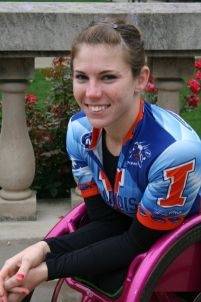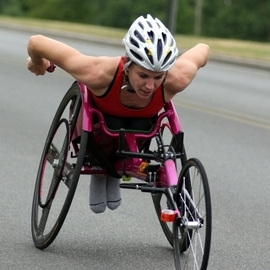October 19, 1991 began as a normal day in Pennsylvania for five-year-old Amanda McGrory. She woke up for kindergarten class, rolled off her bed into a big pile of pillows, and began walking down the hall to the stairs. What Amanda didn’t know, is that within minutes, she would lose her ability to walk. By the time Amanda had reached the stairs, “my muscles had all tightened up, but I was walking like they were made of jelly … really unstable with my knees pointing outwards like a frog.” When she reached the bottom of the stairs, Amanda’s mom helped her lie down on the sofa: “I stretched my legs out and felt pins and needles all the way from my toes to my hips.” She never stood again.
Doctors were convinced that Amanda had suffered a spinal cord injury from rolling off the bed that morning. But after an array of testing, numerous hospitals, and a team of doctors, Amanda was diagnosed with a rare condition called Acute Transverse Myelitis.
Life After
Growing up with a disability is an interesting experience.
 When Amanda returned to her kindergarten class in January of 1992, she was considered the “coolest kid in school.” Her fellow classmates were intrigued by her wheelchair and wanted to play with it. Not to mention that she got to ride the elevator (basically every kindergartener’s dream). However, Amanda reached a point in her life when it all changed. By middle school, the wheelchair had lost some of its uniqueness. It was the age when kids became more concerned with fitting in and looking cool. Luckily, Amanda had a supportive group of friends and a larger support team outside of school … the sports community.
When Amanda returned to her kindergarten class in January of 1992, she was considered the “coolest kid in school.” Her fellow classmates were intrigued by her wheelchair and wanted to play with it. Not to mention that she got to ride the elevator (basically every kindergartener’s dream). However, Amanda reached a point in her life when it all changed. By middle school, the wheelchair had lost some of its uniqueness. It was the age when kids became more concerned with fitting in and looking cool. Luckily, Amanda had a supportive group of friends and a larger support team outside of school … the sports community.
Amanda the Athlete

Amanda dreamed of waking up with the ability to walk again, until she found her niche in sports: “It wasn’t until I learned about wheelchair sports that I really started feeling comfortable with whom I was.” Amanda soon found herself surrounded by an entire community of disabled, active people. These people were attending college, competing at the Paralympics, traveling around the world, and starting families. Amanda finally felt that she had something to work towards: “I too wanted to play sports, and go to college, and have all of these incredible life experiences that I didn’t even know were still possible.”
Amanda’s initial interest in sports was a great way to make new friends and bond with people over things that her able-bodied friends didn’t understand. It wasn’t long until her competitive urge took over: “It was great to go to practice and chat with friends, but I wanted to be faster than them.” Her parents bought her first racing chair (an average of $2,000) and dedicated a considerable amount of time and money to traveling with her for competitions.
Amanda’s Success
 With the support of her friends and family, along with the huge confidence boost that sports brought to her, Amanda went on to compete in the 2008 Beijing Paralympics. Amanda trained six days a week, ten sessions a week, and an average of one hundred and twenty miles per week. This all paid off when she brought home a Paralympic gold medal: “[This] was a huge career defining moment. I love to race, I love challenging myself to go harder, push faster, and be stronger.”
With the support of her friends and family, along with the huge confidence boost that sports brought to her, Amanda went on to compete in the 2008 Beijing Paralympics. Amanda trained six days a week, ten sessions a week, and an average of one hundred and twenty miles per week. This all paid off when she brought home a Paralympic gold medal: “[This] was a huge career defining moment. I love to race, I love challenging myself to go harder, push faster, and be stronger.”
Amanda has since placed in other competitions, such as April’s Boston Marathon. During that competition, Amanda hit a timing mat going downhill and collided with a competitor. She came out of her racing chair and slid across the road on her chest. Though bleeding, she was able to finish in third place. After the race, and before she was aware of the bombings, Amanda started receiving dozens of text messages asking if she was okay. It wasn’t until later that she turned on the television and realized why she was receiving so many concerned messages: “There’s a buzz of positive energy surrounding every marathon — people testing their limits, achieving goals, and celebrating being alive. For something so tragic to occur during an event so positive is disappointingly ironic.”
Amanda’s disability has not overcome her, but is merely stumbling block that she has overcome: “You can accept defeat and let [a disability] define you negatively, or you can fight to overcome and find the positive in the situation.”









